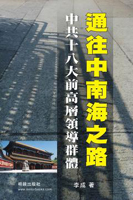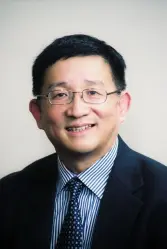 Editor’s Note: China is set to experience a major leadership turnover at the 18th National Congress of the Chinese Communist Party this fall. Current top leaders, including President Hu Jintao, Premier Wen Jiabao, and Chairman of the National People’s Congress Wu Bangguo, are all expected to retire. The Politburo and its Standing Committee will be repopulated with a large number of new faces.
Editor’s Note: China is set to experience a major leadership turnover at the 18th National Congress of the Chinese Communist Party this fall. Current top leaders, including President Hu Jintao, Premier Wen Jiabao, and Chairman of the National People’s Congress Wu Bangguo, are all expected to retire. The Politburo and its Standing Committee will be repopulated with a large number of new faces.
In
The Road to Zhongnanhai
, Cheng Li examines the leaders of tomorrow’s China in five distinct groups: 1. provincial chiefs; 2. cabinet ministers; 3. military leaders; 4. state-owned enterprises; and 5. party apparatchiks.
Learn more about the book (in Chinese) »
Read the English version of the book’s introduction (PDF) »
An excerpt from the book follows:
On the international stage, the negative image of a centralized one-party state has become a hindrance to China’s development. China does not want to continue to be grouped with those few backward and isolated communist or authoritarian states. Besides, China has not yet established a value system generally recognized by the international community, something that is indispensable to the building of China’s soft power. China’s rise to prominence in the 21st century will ultimately depend on its living up to world-recognized standards of governance covering such domains as pluralism, openness, rule of law, human rights, freedom of the press, freedom of faith, and transparency. In fact, no consensus, let alone defining characterization, has been reached on the much-talked-about “China Model” in recent years.
Domestically, China’s political system has become increasingly unable to deal with the country’s complicated and fast-changing problems as the gap keeps growing between urban and rural areas, coastal and inland regions, and the new economy and traditional economic sectors. The wide-ranging problems it faces – including shortages of natural resources, environmental degradation, the side effects of large-scale urbanization, the prospect of an aging society, inadequate health care and social welfare, rapid expansion of state-owned monopolistic enterprises at the expense of private enterprises, rampant government corruption, tensions between the central and local governments, and ethnic conflicts – all call for more effective and efficient governance and the transformation of the country’s political system.
In terms of the CCP itself, the biggest challenge for its leadership will most likely come not from external forces, but from within the party. Over the past thirty years, China has gradually completed the transition from strongman politics in the eras of Mao Zedong and Deng Xiaoping to collective leadership, putting to an end China’s autocratic tradition. Collective leadership inherently involves more factional competition and coalition-building. In the absence of strongman politics, factional compromise has become more common. The CCP’s institutional changes do not reduce factional tensions; quite the contrary, they make factional politics all the more dynamic. Political competition and lobbying activities occur in various forms. For some political elites and the public, it may not be easy to adapt to the new rules of the game. With increasing public dissatisfaction and expectations for a significantly different future, the CCP looks extremely vulnerable in the face of demagogic sentiment. Some political figures are always ready to utilize public resources for their own private gains. It has been widely noted, particularly in China-study communities overseas, that China’s political reforms, including inner-party elections, have made almost no progress at all since the Fourth Plenum of the 17th Central Committee in the fall of 2009. The promising ideas and plans approved in the Plenum have hardly been implemented or even further discussed.
The Brookings Institution is committed to quality, independence, and impact.
We are supported by a diverse array of funders. In line with our values and policies, each Brookings publication represents the sole views of its author(s).



